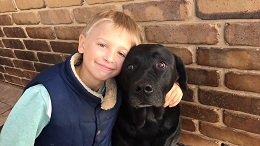 Aldgate schoolboy Angus Bond is the human face of the genomic revolution being led by South Australian researchers.
Aldgate schoolboy Angus Bond is the human face of the genomic revolution being led by South Australian researchers.
The nine-year-old, who has the rare bone marrow disease Diamond-Blackfan Anemia (DBA), has given Adelaide University and SA Pathology researchers a global breakthrough in genetic mapping.
Thanks to state-of-the-art genetic DNA sequencing technology being employed by Professor Hamish Scott and his team at the Centre for Cancer Biology, the cause of Angus’s condition has been correctly diagnosed after years of failed tests.
His condition prevents bone marrow from producing enough red blood cells to move oxygen around the body, necessitating more than 100 blood transfusions in his short life.
The world’s leading diagnostic laboratory in the United States could find no definitive cause for Angus’s condition, but subsequent analysis by Prof Scott’s team pinpointed the genetic mutation.
“Using new genetic technology, we are now able to test a complete set of human genes in a single sweep, so we can see the ‘spelling mistakes’ in DNA,” Prof Scott Says.
“By identifying these spelling mistakes we can more rapidly diagnose genetic diseases and cancer and pinpoint where to target our therapies, reducing both time and costs.”
Prof Scott’s lab was also able to identify why Angus was transfusion dependent for two years – in what doctors called “a spontaneous remission”.
“In some of the cells in Angus’s bone marrow, the DNA from one chromosome had spontaneously copied itself to fill in the missing DBA gene. The finding raises the possibility of selecting for these repaired cells in patients or replicating the same changes in other patients using revolutionary gene or cell therapy approaches,” Prof Scott says.
The breakthrough has now been documented in a new paper released today in Haemotologica, the journal of the European Hematology Association and the Ferrata Storti Foundation.
“South Australia is at the forefront of this biomedical revolution and – without doubt – sequencing technology is changing the way we understand human health and disease,” Prof Scott says. “However, we desperately need additional investment to continue this work.”
Prof Scott says people can help support the research by donating to the Centre for Cancer Biology or the Captain Courageous Foundation, a non-for-profit organisation established by Angus’s mother Jessica Bond, exploring cures for rare blood diseases.



